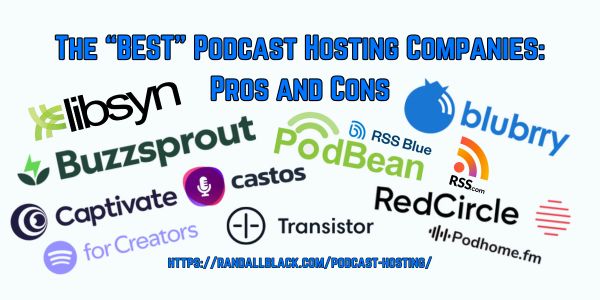Introduction
Choosing the right podcast hosting platform is crucial for success. A good host provides reliable storage, analytics, monetization options, and seamless distribution to podcast directories. In this guide, we’ll compare some of the best podcast hosting companies, outlining their pros and cons to help you make an informed decision.
1. Buzzsprout
Pros:
✅ User-friendly interface
✅ Dynamic ad insertion
✅ Good analytics
✅ Automatic episode optimization
Cons:
❌ Limited storage on free plan
❌ No unlimited bandwidth
2. Libsyn
Pros:
✅ Established and reliable platform
✅ IAB-certified analytics
✅ Extensive distribution options
Cons:
❌ Dated interface
❌ No free plan
3. Captivate
Pros:
✅ Advanced analytics
✅ Private podcasting features
✅ Good for podcast networks
Cons:
❌ Higher price compared to others
❌ No free plan
4. Transistor
Pros:
✅ Unlimited podcasts per account
✅ Strong analytics
✅ Good for brands & networks
Cons:
❌ More expensive than some competitors
❌ No free plan
5. Podbean
Pros:
✅ Free tier available
✅ Live-streaming feature
✅ Monetization options (ads, patron support)
Cons:
❌ Limited customization
❌ Ads on free plan
6. Anchor (Spotify for Podcasters)
Pros:
✅ Completely free
✅ Simple distribution
✅ Integrated with Spotify
Cons:
❌ Limited monetization outside Spotify
❌ Less control over RSS feed
7. Castos
Pros:
✅ Great WordPress integration
✅ Private podcasting support
✅ Video republishing options
Cons:
❌ Higher cost
❌ WordPress reliance for full benefits
8. RedCircle
Pros:
✅ Free hosting
✅ Dynamic ad insertion
✅ Cross-promotion tools
Cons:
❌ Revenue sharing model
❌ Less established than others
9. Blubrry
Pros:
✅ PowerPress plugin for WordPress
✅ IAB-certified stats
✅ Self-hosting option
Cons:
❌ Learning curve for beginners
❌ Pricing can be complex
10. RSS.com
Pros:
✅ Simple and user-friendly
✅ Educational discounts
✅ Sponsorship marketplace
Cons:
❌ Limited advanced features
❌ No free plan
11. RSS Blue
Pros:
✅ Supports direct payments to creators via the Lightning Network
✅ Focus on music podcasters with features like combining songs into albums
✅ Utilizes open standards for broad compatibility
✅ Supports Podcasting 2.0 features like transcripts, chapters, and value tags
Cons:
❌ Limited information on pricing and storage options
❌ May require technical knowledge to fully utilize advanced features
❌ Less established compared to other platforms
12. Podhome
Pros:
✅ Unlimited podcasts, episodes, uploads, and downloads for a flat fee
✅ AI-powered tools for transcripts, chapters, and audio enhancement
✅ Customizable podcast website and embeddable player
✅ Supports Podcasting 2.0 features, including Value4Value and live podcasting
✅ User-friendly interface with advanced analytics
Cons:
❌ Relatively new platform with a smaller user base
❌ Limited monetization options; lacks programmatic ads
❌ Pricing may be higher compared to some competitors
Conclusion
Each podcast hosting platform offers unique advantages, depending on your needs. Whether you prioritize monetization, ease of use, advanced analytics, or Podcasting 2.0 features, there’s a solution for you. Choose wisely and ensure your hosting service aligns with your podcasting goals!
